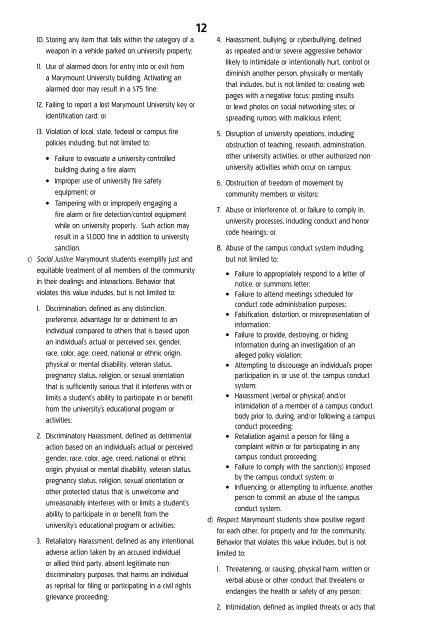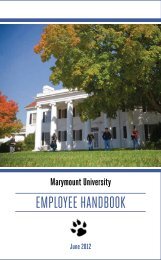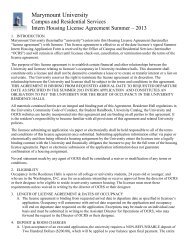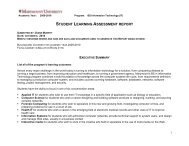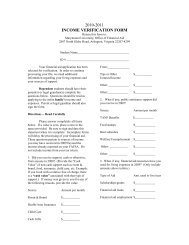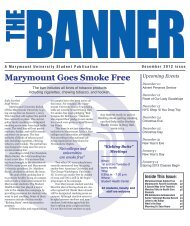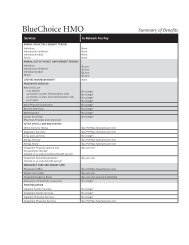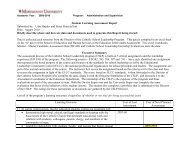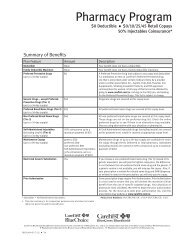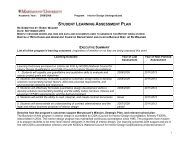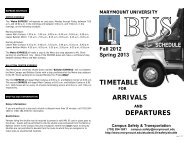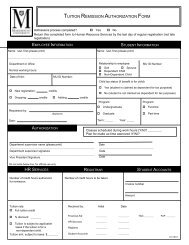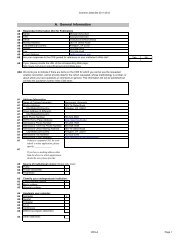Student Handbook - Marymount University
Student Handbook - Marymount University
Student Handbook - Marymount University
Create successful ePaper yourself
Turn your PDF publications into a flip-book with our unique Google optimized e-Paper software.
10. Storing any item that falls within the category of a<br />
weapon in a vehicle parked on university property;<br />
11. Use of alarmed doors for entry into or exit from<br />
a <strong>Marymount</strong> <strong>University</strong> building. Activating an<br />
alarmed door may result in a $75 fine;<br />
12. Failing to report a lost <strong>Marymount</strong> <strong>University</strong> key or<br />
identification card; or<br />
13. Violation of local, state, federal or campus fire<br />
policies including, but not limited to:<br />
• Failure to evacuate a university-controlled<br />
building during a fire alarm;<br />
• Improper use of university fire safety<br />
equipment; or<br />
• Tampering with or improperly engaging a<br />
fire alarm or fire detection/control equipment<br />
while on university property. Such action may<br />
result in a $1,000 fine in addition to university<br />
sanction.<br />
c) Social Justice: <strong>Marymount</strong> students exemplify just and<br />
equitable treatment of all members of the community<br />
in their dealings and interactions. Behavior that<br />
violates this value includes, but is not limited to:<br />
1. Discrimination, defined as any distinction,<br />
preference, advantage for or detriment to an<br />
individual compared to others that is based upon<br />
an individual’s actual or perceived sex, gender,<br />
race, color, age, creed, national or ethnic origin,<br />
physical or mental disability, veteran status,<br />
pregnancy status, religion, or sexual orientation<br />
that is sufficiently serious that it interferes with or<br />
limits a student’s ability to participate in or benefit<br />
from the university’s educational program or<br />
activities;<br />
2. Discriminatory Harassment, defined as detrimental<br />
action based on an individual’s actual or perceived<br />
gender, race, color, age, creed, national or ethnic<br />
origin, physical or mental disability, veteran status,<br />
pregnancy status, religion, sexual orientation or<br />
other protected status that is unwelcome and<br />
unreasonably interferes with or limits a student’s<br />
ability to participate in or benefit from the<br />
university’s educational program or activities;<br />
3. Retaliatory Harassment, defined as any intentional,<br />
adverse action taken by an accused individual<br />
or allied third party, absent legitimate nondiscriminatory<br />
purposes, that harms an individual<br />
as reprisal for filing or participating in a civil rights<br />
grievance proceeding;<br />
12<br />
4. Harassment, bullying, or cyberbullying, defined<br />
as repeated and/or severe aggressive behavior<br />
likely to intimidate or intentionally hurt, control or<br />
diminish another person, physically or mentally<br />
that includes, but is not limited to: creating web<br />
pages with a negative focus; posting insults<br />
or lewd photos on social networking sites; or<br />
spreading rumors with malicious intent;<br />
5. Disruption of university operations, including<br />
obstruction of teaching, research, administration,<br />
other university activities, or other authorized nonuniversity<br />
activities which occur on campus;<br />
6. Obstruction of freedom of movement by<br />
community members or visitors;<br />
7. Abuse or interference of, or failure to comply in,<br />
university processes, including conduct and honor<br />
code hearings; or<br />
8. Abuse of the campus conduct system including,<br />
but not limited to:<br />
• Failure to appropriately respond to a letter of<br />
notice, or summons letter;<br />
• Failure to attend meetings scheduled for<br />
conduct code administration purposes;<br />
• Falsification, distortion, or misrepresentation of<br />
information;<br />
• Failure to provide, destroying, or hiding<br />
information during an investigation of an<br />
alleged policy violation;<br />
• Attempting to discourage an individual’s proper<br />
participation in, or use of, the campus conduct<br />
system;<br />
• Harassment (verbal or physical) and/or<br />
intimidation of a member of a campus conduct<br />
body prior to, during, and/or following a campus<br />
conduct proceeding;<br />
• Retaliation against a person for filing a<br />
complaint within or for participating in any<br />
campus conduct proceeding;<br />
• Failure to comply with the sanction(s) imposed<br />
by the campus conduct system; or<br />
• Influencing, or attempting to influence, another<br />
person to commit an abuse of the campus<br />
conduct system.<br />
d) Respect: <strong>Marymount</strong> students show positive regard<br />
for each other, for property and for the community.<br />
Behavior that violates this value includes, but is not<br />
limited to:<br />
1. Threatening, or causing, physical harm, written or<br />
verbal abuse or other conduct that threatens or<br />
endangers the health or safety of any person;<br />
2. Intimidation, defined as implied threats or acts that


